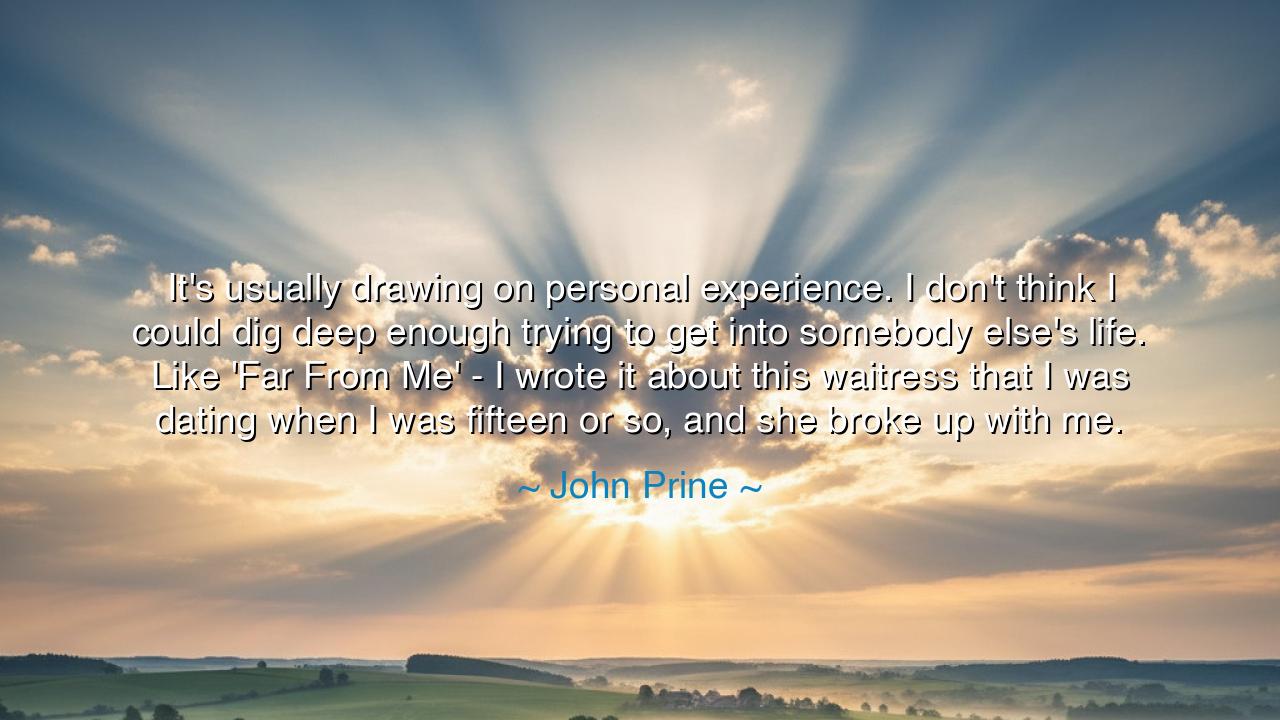
It's usually drawing on personal experience. I don't think I
It's usually drawing on personal experience. I don't think I could dig deep enough trying to get into somebody else's life. Like 'Far From Me' - I wrote it about this waitress that I was dating when I was fifteen or so, and she broke up with me.






In the humble and heartfelt words of John Prine, we find the essence of true artistry: “It’s usually drawing on personal experience. I don’t think I could dig deep enough trying to get into somebody else’s life. Like ‘Far From Me’ – I wrote it about this waitress that I was dating when I was fifteen or so, and she broke up with me.” What may at first seem like a simple reflection from a songwriter is, in truth, a profound meditation on the roots of creation, the honesty of art, and the eternal power of human experience. In this single confession lies a wisdom older than any instrument — the understanding that what moves the world is not imitation, but truth; not the performance of feeling, but the living of it.
When Prine spoke these words, he revealed the secret that all true artists eventually discover: that authenticity is the wellspring of beauty. His music, often simple in form yet infinite in emotion, was born not from grand philosophies but from memory and heartache, from the small and tender details of ordinary life. The song he mentions, “Far From Me,” tells the story of young love’s quiet demise — not in anger or betrayal, but in the aching silence of growing apart. It is the kind of pain that does not cry out but lingers, soft and unending. Only one who has lived such a moment could write of it so truthfully. And therein lies Prine’s genius: he did not invent emotions; he remembered them.
The ancients, too, understood this truth. The poet Homer sang of heroes, yet his verses are not merely tales of battle, but echoes of human longing and loss. When Achilles mourns Patroclus, it is not the grief of a legend we hear, but the grief of every man who has ever lost a friend. Homer’s gift, like Prine’s, was to pour personal truth into universal form. The heart, once honest, becomes a mirror for all humanity. To “dig deep” into another’s life, as Prine said he could not, is not necessary when one’s own depths contain the same waters. For the human soul, though housed in different bodies, shares a common ocean of feeling.
Prine’s wisdom also reminds us that creation must begin with vulnerability. To write, to paint, to sing — these are acts of exposure. They demand that we open our old wounds and let others see them. The temptation, especially for those who fear judgment, is to invent: to hide behind characters, to tell stories that are safe because they are not our own. But such works seldom last. Only truth endures. The greatest artists, from Frida Kahlo to Vincent van Gogh, from Emily Dickinson to Leonard Cohen, all drew from their own suffering and joy, transforming pain into beauty, confusion into clarity. As Prine said, he could not “dig deep enough” into another’s life — because it is only through the mine of one’s own heart that gold can be found.
There is something deeply noble in this devotion to the personal. To draw from experience is not self-absorption; it is honesty in service of connection. When Prine sang of lost love or loneliness, he was not seeking pity, but offering recognition. The listener, hearing his song, might think, “Yes — I have felt this too.” In that moment, isolation dissolves, and music fulfills its highest purpose: to remind us that none of us suffers or rejoices alone. Every personal story, when told truthfully, becomes universal.
The lesson of Prine’s words is timeless: speak from where you stand. Do not strive to inhabit another’s story before you have learned to tell your own. Your experience — however humble, however small — is enough, for truth has no measure. Write of your heartbreak, your laughter, your hometown, your scars. Let the simple moments of your life be the seed of your creation. The truest art does not come from ambition, but from attention — from noticing the beauty in the waitress’s smile, the sorrow in her silence, the ache in the goodbye that lingers for years.
And so, let this teaching be carried forward: the artist’s greatest gift is not imagination alone, but memory made luminous. To live deeply is to create deeply. When John Prine wrote of his fifteen-year-old heartbreak, he gave the world something eternal — proof that even the smallest sorrow, when expressed with honesty, becomes a song that outlasts its maker. So too may we, in our own ways, turn our lives into music: to face our truths without shame, to craft from our wounds a beauty that might heal others, and to know that from the soil of our own hearts, the flowers of shared humanity forever bloom.






AAdministratorAdministrator
Welcome, honored guests. Please leave a comment, we will respond soon